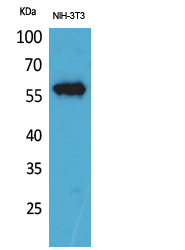anti-LAG-3 (human), mAb (17B4) (blocking) (preservative free)
AG-20B-0012PF
ApplicationsFlow Cytometry, ImmunoPrecipitation, Western Blot, ImmunoCytoChemistry, ImmunoHistoChemistry, Neutralisation/Blocking
Product group Antibodies
ReactivityHuman
TargetLAG3
Overview
- SupplierAdipoGen Life Sciences
- Product Nameanti-LAG-3 (human), mAb (17B4) (blocking) (preservative free)
- Delivery Days Customer10
- ApplicationsFlow Cytometry, ImmunoPrecipitation, Western Blot, ImmunoCytoChemistry, ImmunoHistoChemistry, Neutralisation/Blocking
- CertificationResearch Use Only
- ClonalityMonoclonal
- Clone ID17B4
- Concentration1 mg/ml
- Estimated Purity>95%
- Gene ID3902
- Target nameLAG3
- Target descriptionlymphocyte activating 3
- Target synonymsCD223, lymphocyte activation gene 3 protein, lymphocyte-activation gene 3
- HostMouse
- IsotypeIgG1
- Protein IDP18627
- Protein NameLymphocyte activation gene 3 protein
- Scientific DescriptionLymphocyte activation gene 3 (LAG-3; CD223) plays an important role in negatively regulating T cell proliferation, function and homeostasis. It is required for maximal natural and induced regulatory T cell (Treg) function. LAG-3 is closely related to the T cell co-receptor CD4 and binds to MHC class II molecules but with a significantly higher affinity than CD4. - Monoclonal Antibody. Recognizes human LAG-3. Isotype: Mouse IgG1. Clone: 17B4. Applications: FACS, FUNC (Blocking), ICC, IHC, IP, WB. Liquid. In PBS. Lymphocyte activation gene 3 (LAG-3; CD223) plays an important role in negatively regulating T cell proliferation, function and homeostasis. It is required for maximal natural and induced regulatory T cell (Treg) function. LAG-3 is closely related to the T cell co-receptor CD4 and binds to MHC class II molecules but with a significantly higher affinity than CD4.
- ReactivityHuman
- Storage Instruction-20°C,2°C to 8°C
- UNSPSC41116161






